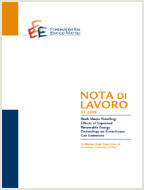Market Equilibrium in the Presence of Green Consumers and Responsible Firms: a Comparative Statics Analysis

05.04.2011
Nicola Doni, Giorgio Ricchiuti
D62, L13, L21
Green Consumers, Corporate Social Responsibility, Vertical Differentiation
Climate Change and Sustainable Development
Carlo Carraro
This paper analyzes how the interaction between green consumers and responsible firms affects the market equilibrium. The main result is that a higher responsibility by both producers and consumers can have different impacts on the efficiency of the firms’ abatement activity, depending on the nature of the cleaning costs. When the abatement costs are fixed, the efficiency of the clean-up effort is always increasing in their degree of responsibility. On the other hand, when the abatement costs are variable, a higher level of responsibility may reduce social welfare. Finally, the first best allocation is never reached, even in the presence of the highest credible level of responsibility of both consumers and producers.
